Mary Anne Yarde's Blog: The Coffee Pot Book Club , page 96
April 2, 2020
Join #HistoricalRomance author, Anna Campbell, as she takes a look at Life in the time of Friedrich Wilhelm Herschel. There is also a chance to check out Anna's fabulous new book — The Highlander’s English Bride #Astronomy @AnnaCampbelloz

Life in the time of Friedrich Wilhelm HerschelBy Anna Campbell
Look to the Stars! Two important Georgian Astronomers — and One is a Woman!Hi Mary Anne! Thank you for having me as your guest today on The Coffee Pot Book Club. I always love visiting and talking to your readers. The Highlander’s English Bride, my new release, is a Regency romance set in both London and Scotland, and the hero is an astronomer. Not only that, the heroine is also a scientist who was her famous astronomer father’s right-hand woman. I set up Hamish Douglas, Laird of Glen Lyon, as a future astronomer way back when I wrote the prologue for book 1 of the Lairds Most Likely series, The Laird’s Willful Lass, released in 2018. This latest one is book 6 in the series, so it’s taken me a while to get here but finally I made it! As I wrote this story, I had such fun throwing astronomical details and star imagery into the mix. My hero Hamish is all set to emulate his hero, the discoverer of the planet Uranus, William Herschel. My heroine, Emily Baylor, who chafes at the restrictions placed on a woman wishing to succeed in the scientific world, idolises William Herschel’s sister, Caroline. So I thought today I’d say a few words about both of these brilliant German emigrés to Britain and their contributions to science.William Herschel was born Friedrich Wilhelm Herschel in 1738 in Hanover, Germany. If he wasn’t so famous as an astronomer, he’d be remembered in a minor way as a composer. He played in a military band, was an excellent performer on oboe, violin, harpsichord and organ, and wrote a large number of works including 24 symphonies.
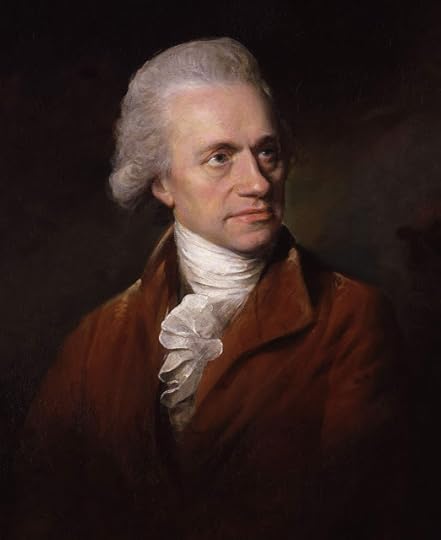 1785 portrait of Friedrich Wilhelm Herschel by Lemuel Francis Abbott — Wikipedia.
1785 portrait of Friedrich Wilhelm Herschel by Lemuel Francis Abbott — Wikipedia.William immigrated to England in 1757 and soon found work as a musician. Eventually he settled in Bath. His interests turned towards mathematics and astronomy, and he started a systematic search for double stars. His work in this field laid the foundation for modern binary star astronomy. He also gained an international reputation as a designer and builder of telescopes. His most famous achievement is the discovery of Uranus in 1781. Originally he called the planet the Georgian Star in honor of King George III, who would become an important patron. The French however didn’t like this much, and they called the new planet Herschel. Eventually Uranus was the name that stuck. The list of William’s scientific achievements is long and impressive – well worth looking up. Among them, he proved that coral wasn’t a plant; he discovered infrared radiation in sunlight; he discovered two new moons for Saturn and two for Uranus; and he postulated a link between sunspot activity and climatic conditions on earth. He died at Slough in 1822, lauded throughout the world for his scientific work and laden with honours, including membership of the Royal Society and the first presidency of the Astronomical Society (later the Royal Astronomical Society). Caroline Herschel was born in Hanover in 1850 and her childhood sounds sad, but typical for that era. Her mother refused her the education she longed for and treated her as an unpaid servant. She fell ill with typhus when she was ten and that disease stunted her growth – she was only 4 foot 3 – and affected the vision in her left eye.
 Caroline Herschel at 78, one year after winning the Gold Medal of the Royal Astronomical Society in 1828.
Caroline Herschel at 78, one year after winning the Gold Medal of the Royal Astronomical Society in 1828.After her father’s death (her father had given her some tutoring on the sly), her brother invited her to England to become his housekeeper. There she finally had the opportunity to study. She ended up becoming both a professional musician and her brother’s scientific assistant. In 1783, she made her first discovery in her own right, a nebula. Through the coming years, Caroline stacked up an impressive number of firsts, including:The first woman to receive a salary as a scientistThe first woman to receive a government salaryThe first woman to be elected an (honorary) member of the Royal Society along with Mary Somerville, another very impressive and interesting Regency scientistThe first woman to receive the Royal Astronomical Society’s Gold Medal. This was in 1828. We had to wait until 1996 to see another woman (Vera Rubin) receive this particular accolade!During her career, Caroline discovered eight comets and completed a number of significant catalogues of heavenly objects. She returned to Hanover in 1822 after William’s death, and continued her work there until her death at the age of 98 in 1848. The asteroid 281 Lucretia is named after her (Lucretia was her middle name). I admire William. How could I not? For a start, I love that his talents covered such a wide field. But I have to say I’m in complete awe of Caroline. Given the odds stacked against her, she must have been both astonishingly clever and remarkably determined to achieve what she did. I’ve got a download of The Highlander’s English Bride to give away today. International. To be in the draw, just tell me a female historical figure you admire and why. Scroll down and leave your answers in the comments!
The Highlander’s English BrideBy Anna Campbell

An impossible pairing…Hamish Douglas, the mercurial Laird of Glen Lyon, has never got along with independent, smart-mouthed Emily Baylor. Which wouldn’t matter if this brilliant Scottish astronomer didn’t move in the same scientific circles as Emily and if her famous father wasn’t his mentor. But when Emily looks likely to derail the event which will make Hamish’s career, he loses his temper with the pretty miss and his recklessness leaves her reputation in ruins.A marriage made in scandal…Emily has always thought her father’s spectacular protégé was far too arrogant for his own good. But what is she to do when the only way she can save her good name in society is to wed the unruly laird? Reluctantly she accepts Hamish’s proposal, but only on the condition that their union remains chaste. That shouldn’t be a problem; they’ve never been friends, let alone potential lovers – except that after they marry, Hamish reveals unexpected depths and a host of admirable qualities, and he’s so awfully handsome, and now the swaggering rogue admits that he desires her…From the ballrooms of London to the grandeur of the western Highlands, a battle royal rages between these two strong-willed combatants. Neither plans to yield an inch – but are these smart people smart enough to see that sometimes the greatest victory lies in mutual surrender?
Pick up your copy ofThe Highlander’s English BrideAmazon US • Amazon UK • Amazon AU • iBooks• Kobo.
Anna Campbell
 ANNA CAMPBELL has written 10 award-winning historical romances for Grand Central Publishing and Avon HarperCollins and her work is published in 22 languages. She has also written 23 bestselling independently published romances. Anna has won numerous awards for her Regency-set stories including Romantic Times Reviewers Choice, the Booksellers Best, the Golden Quill (three times), the Heart of Excellence (twice), the Write Touch, the Aspen Gold (twice) and the Australian Romance Readers Association’s favorite historical romance (five times). Anna is currently engaged in writing the Lairds Most Likely series which starts with The Laird’s Willful Lass (2018). When she’s not travelling the world seeking inspiration for her stories, she lives on the beautiful east coast of Australia.
ANNA CAMPBELL has written 10 award-winning historical romances for Grand Central Publishing and Avon HarperCollins and her work is published in 22 languages. She has also written 23 bestselling independently published romances. Anna has won numerous awards for her Regency-set stories including Romantic Times Reviewers Choice, the Booksellers Best, the Golden Quill (three times), the Heart of Excellence (twice), the Write Touch, the Aspen Gold (twice) and the Australian Romance Readers Association’s favorite historical romance (five times). Anna is currently engaged in writing the Lairds Most Likely series which starts with The Laird’s Willful Lass (2018). When she’s not travelling the world seeking inspiration for her stories, she lives on the beautiful east coast of Australia.Connect with Anna: Website • Facebook • Twitter • BookBub • Goodreads.

Published on April 02, 2020 20:00
April 1, 2020
#BookReview — The Sign of the Blood (A Dangerous Emperor, Book #1) by Laurence O'Bryan #HistoricalFiction #AncientRome @LPOBryan

The Sign of the Blood(A Dangerous Emperor, Book #1)By Laurence O'Bryan
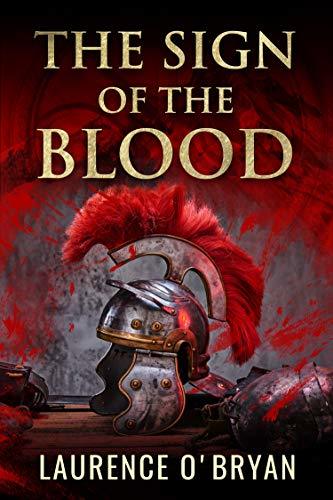
A compelling tale of power, destiny and desire from an award winning, #1 Amazon bestselling author.Cool mist settles over the legion sneaking toward the Persian army. Constantine, the son of an emperor, the Roman officer leading this raid, tells his men to halt - something is wrong. Have they been seen in the pre-dawn light? Before long, the battle rages. Eventually he frees a slave named Juliana. She is half Persian and half Roman. As they are pursued to Britannia over land and sea, he learns that she can see the future - his future.It is 306A.D., long before Constantine the Great converted to Christianity and became the first Christian emperor.To ensure he survives, he must now eliminate his enemies. But who must die first? The priestess, Sybellina, who joined them in Rome and practices dark and seductive magic? Or the brutal legion commanders who surround his father? Or, as Juliana suspects, are those who want him dead even closer?An electrifying historical novel about Constantine’s bloody rise to power, the woman who helped him, and the real reason he supported a persecuted Christian minority, a decision which changed the world into the one we know.

"Everything would have been so different if the Persians hadn't come."
But come they did, and Juliana's life was irrevocably changed forever. No longer free, she is sold into slavery. Her life is now at the mercy of her master.
Constantine dreams of the day he can escape Galerius' grasp and stand on the battlefield next to his father. But right now, he must concentrate on staying alive. A chance discovery may well help him take control of his destiny once and for all. If he can defeat the Persians, if he can bring honour to his name then maybe, just maybe, his father will name him as heir and one day he too will become an Emperor.
From the Battle of Satala to the death of an Emperor, The Sign of the Blood (A Dangerous Emperor, Book #1) by Laurence O'Bryan is the unforgettable story of Constantine the Great's rise to power.
With an elegant turn of phrase and a visceral understanding of what makes history worth reading, O'Bryan has given his readers a Constantine that is incredibly real in the telling. Constantine is a young man who wants to achieve recognition, who wants to become a man whom his father, Emperor Constantius Chlorus, would be proud of. At the beginning of this tale of Emperors and Empires, Constantine is at the mercy of Emperor Galerius. Historical sources tell us that there were numerous plots by Galerius to end Constantine's life but without much success. O'Bryan gives his readers a very lucid account of Constantine's struggle with being at the mercy of Galerius, and also his subsequent flight from the man who had blighted his life for many years.
Constantine is a very likeable character in this story. He is an honourable and kind man whose struggles with his destiny and what that destiny might mean for everyone around him. He is appalled by acts of unnecessary violence by men such as Governor Martinianus, and he cannot stand aside and remain silent about the injustice that he bears witness to. O'Bryan has certainly painted a portrait of how and why Constantine became who he was.
The other protagonist in this tale is a young girl, who has both Persian and Roman blood running through her veins. Rescued from the Persians by Constantine, Juliana's story is tragically moving. From slave to free woman, Julianna is the kind of protagonist a reader can get behind and root for. Although fictional in the telling, Juliana brings so much to the narrative of this novel, and she really drives the plot forward. Through her, O'Bryan describes what life was like for a slave and how it wasn't just a brutal master a slave had to fear — sometimes it was the other slaves as well. I feared for Juliana's life on more than one occasion, she really does go through the mill — it is one trauma after another. O'Bryan has her respond to the events that befall her in a very human way. Juliana is a strong character because she has to be if she wants to survive, but the emotional trauma that she suffers is evident throughout this book.
There are a host of secondary characters in this novel, which bring something unique to the story, and they all have their parts to play. I thought O'Bryan's portrayal of Lucius Aurelius Armenius was sublime. O'Bryan's depiction of the priestess, Sybellina, brings something very sinister to the plot as well.
Writing historical fiction set during the Roman Empire is incredibly challenging. The "history" of the period is often not consistent with the sources — for inscriptions, and the scribes who documented the history are often biased in their account of events. There are primary sources aplenty but the authenticity, the truth, is often hidden behind almost two thousand years worth of political propaganda. Therefore, I have tremendous respect for authors who write about the Roman Empire. But, I am particularly respectful of those who write about the Crisis of the Third Century which saw the Roman Empire's near collapse under the combined pressures of civil wars, peasant rebellions, political instability and barbarian invasions. This was a time when Roman resilience was tested to its limits. O'Bryan's book begins just after this crisis in 297 AD. He has portrayed the turn of the 4th century with a lavish sense of opulence. Nothing, it seems, is beyond the telling — from the Persian camp to the grandeur of the Imperial Palace. O'Bryan takes us on a journey of historical discovery and architectural brilliance. He writes with such skill and authority that I could almost smell the stench and fear of the slave markets — the metallic taste of blood on the battlefields.
It is the battle scenes that are portrayed with such vivid attention to the historical detail where O'Bryan seemingly comes into his own — they are lucid, evocative, and all too graphic in the telling. The fear, the despair, and the adrenaline of the soldiers as they fought to stay alive rang clearly out through the crystalline prose and expressive narrative. It is clear to see that O'Bryan was in his absolute element as he composed these scenes. The ambush by the Roman army of the Persians camp was especially vivid in the telling. Kudos Mr O'Bryan. Kudos, indeed.
There are many distressing scenes in this book that some readers will find very upsetting. O'Bryan does not shy away from the absolute horror that women and children faced when captured by the enemy. Nor does he sugarcoat what it was like to be a slave during this era. The romantic notions of The Roman Empire, the staggering architectural triumphs, and the extravagant lifestyle that the Imperial family and the patricians lived are overshadowed by the brutality of what life was like if you were a plebeian or a slave. Therefore, it is fitting that O'Bryan explores the fragility and frailty of the human condition throughout this book. We see humanity at its best and its worst. This attention to detail, along with a story that is impressive as it is splendid, made this novel unputdownable.
The Sign of the Blood (A Dangerous Emperor, Book #1) by Laurence O'Bryan is a book that is especially hard to turn away from. It captured my attention from the opening sentences and did not let go of me until the final full-stop. It is an enthralling story from start to finish.
The Sign of the Blood is a must-read for fans of battle heavy Historical Fiction and for anyone with an interest in Constantine the Great and Ancient Rome.
I Highly Recommend.
Review by Mary Anne Yarde.The Coffee Pot Book Club.
Pick up your copy ofThe Sign of the BloodAmazon UK • Amazon US
Laurence O'Bryan

My roots go back to a small estate deep in the Mountains of Mourne near the Silent Valley, in County Down, Northern Ireland.
I went to school in Dublin, drank way too much, studied English and history, then business, then IT at Oxford University.
My research has taken me all over the world, from San Francisco to deep in the Muslim world. There are secrets everywhere. I enjoy writing about them. I hope you enjoy reading about them.
I grew up learning Latin and loving books such as Robert Graves', I, Claudius. I spent over twenty years studying Roman history, reading every book about Constantine the Great I could find, and visiting numerous sites where my Roman series is set, including, Jerusalem, Rome and Istanbul.
My books have:
* Achieved #1 ranking on Amazon,
* Been translated into 10 languages.
Laurence is also the founder of BooksGoSocial.
Connect with Laurence: Amazon Author Page • Twitter • Goodreads.
Published on April 01, 2020 21:00
Join #HistoricalFiction author, Drema Drudge, as she takes a look at Life in the Time of Women Artists in Mid-19th Century Paris. There is also a chance to check out Derma's fabulous book — Victorine

Life in the Time of Women Artists in Mid-19th Century ParisBy Drēma Drudge Women have surely wanted to paint as long as men have. They, in childhood, were perhaps supplied with paper and ink, with some chalk, if lucky, the same as their male siblings. But while men who showed artistic longings and promise might be encouraged to go to art school, women with similar desires in mid-19th century Paris were ridiculed, discouraged, and downright forbidden by the art world and their own families.One of the best-known Impressionists of the Impressionism movement of the time is Berthe Morisot. What we forget, however, is her becoming a painter of note was nearly impossible at the time she achieved it.
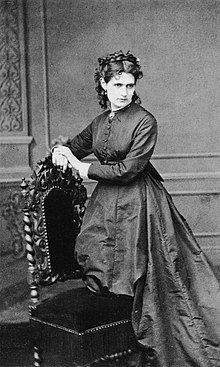 Berthe Morisot.
Berthe Morisot.Morisot’s case is emblematic of those of other women with artistic ambitions of her time, and in this case, her family’s money and position were detriments to her desire to paint. In fact, the art instructor that her mother hired for her children (meant to help them become “accomplished,” a desirable trait in women at the time), warned the mother of his charges, Berthe and Edma, that “Considering the characters of your daughters, my teaching will not endow them with minor drawing room accomplishments, they will become painters. Do you realize what this means? In the upper-class milieu to which you belong, this will be revolutionary, I might say almost catastrophic.” Surely he meant that as a kindly warning to a caring mother, not to discourage what would becoming a leading artist in the Impressionist period. Sadly, women of any class weren’t encouraged to be fine artists. Mercifully, the girls’ mother remained supportive of their painting.Life for women who wanted to paint in France in the 18th century wasn’t easy. Of course women who painted as a hobby, who painted sweet little watercolors was acceptable at home, sure. A woman should know how to embroider, paint, play a little piano, sing sweetly, but anything beyond that was “masculine” and an obstacle to what was supposed to be a woman’s main aim: catching a husband.The problem was, women were not welcomed into traditional art classes in Paris. Until 1897, women were not admitted to the official art school, École des Beaux-Arts. Instead, they had to turn to private instructors or the studios of other artists who didn’t teach them nearly as much and often charged them much more than males were charged. And yet, some women were desperate enough to accept these terms in order to paint. When women were accepted into the École des Beaux-Arts, they were excluded from both life study and painting classes initially. They weren’t allowed to take classes with their male counterparts.The biggest objection to admitting women to the official art school of France? Women would be corrupted, it was feared, by beholding the naked form in classes, which, alas, was considered to be crucial to doing the most esteemed (and best-paying) category of paintings: historic scenes which featured partially clothed or nude bodies. So women painted in the other, less esteemed genres. “Acceptable” subject matter was anything domestic, such as home scenes and those of the commonplace: washing day, reading, children, pets, portraits and still life.The Morisot sisters were blessed to have a sympathetic mother, which was key to those few women who furthered themselves as artists. Their mother, in response to their instructor’s warning, sent her children to work with artist Joseph-Benoît Guichard, who had been a pupil of Ingres and Delacroix, and thus came highly recommended. History bears witness to the effectiveness of this approach in the case of Berthe; marriage caused Erma to sideline her own work. It would have been intriguing to see how her work might have developed in comparison with her sister’s.If women of the upper class found it almost impossible to be accepted into the art world of Paris, those without money were nearly completely shut out. Victorine Meurent, the well-known model in her time of most notably Edouard Manet (she sat for Olympia and Luncheon on the Grass) as well as others, had to wait until nearly a decade after she had posed for all of those other painters to get into art school herself. One supposes that, having come from poverty, she had to save up to earn her way in.
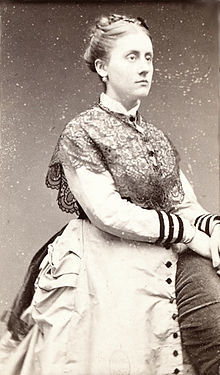 Victorine Meurent.
Victorine Meurent.Sometimes women with painterly ambitions simply refused to marry. That tended to be the surest way to ensure a woman could continue to devote herself exclusively to art, a luxury rarely afforded those who married and had children. Painters Rosa Bonheur and the well-known Impressionist Mary Cassatt both didn’t marry at all, opting instead to immerse themselves in their art. Women were meant to be wives and mothers, society said. All too often if a woman did paint, once she married, she would give it up to take care of her family. When artist Marie Bracquemond’s marriage developed tension due to her rivalry with her husband, Félix Bracquemond, who was also a painter, she stopped painting.Some women, such as Berthe Morisot, had ties to established artists, which gave them as well a kind of entre into the art world to which they would otherwise not have been accepted. In Morisot’s case, that artist was the man who would eventually become her brother-in-law, Edouard Manet. Manet also took on Eva Gonzales as a student, helping her development her work until she decided to marry, dying just after the birth of her first child.Although these women artists of the mid-19th century faced challenges women artists today do not, women still struggle to have their work valued and exhibited equally with that of their male counterparts.
VictorineBy Drēma Drudge

In 1863, Civil War is raging in the United States. Victorine Meurent is posing nude, in Paris, for paintings that will be heralded as the beginning of modern art:
Manet's Olympia and Picnic on the Grass.
However, Victorine's persistent desire is not to be a model but to be a painter herself. In order to live authentically, she finds the strength to flout the expectations of her parents, bourgeois society, and the dominant male artists (whom she knows personally) while never losing her capacity for affection, kindness, and loyalty. Possessing both the incisive mind of a critic and the intuitive and unconventional impulses of an artist, Victorine and her survival instincts are tested in 1870, when the Prussian army lays siege to Paris and rat becomes a culinary delicacy.
Drema Drudge's powerful first novel Victorine not only gives this determined and gifted artist back to us but also recreates an era of important transition into the modern world.
The Coffee Pot Book Club★★★★★ Highly RecommendedRead the full review HERE!

Pick up your copy ofVictorineAmazon
Drēma Drudge
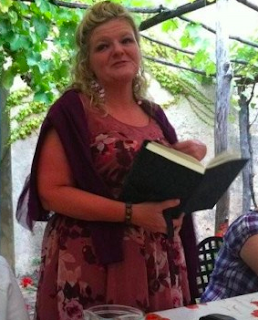 Drēma Drudge suffers from Stendhal’s Syndrome, the condition in which one becomes overwhelmed in the presence of great art. She attended Spalding University’s MFA in Creative Writing Program where she learned to transform that intensity into fiction.
Drēma Drudge suffers from Stendhal’s Syndrome, the condition in which one becomes overwhelmed in the presence of great art. She attended Spalding University’s MFA in Creative Writing Program where she learned to transform that intensity into fiction.Drēma has been writing in one capacity or another since she was nine, starting with terrible poems and graduating to melodramatic stories in junior high that her classmates passed around literature class.
She and her husband, musician and writer Barry Drudge, live in Indiana where they record their biweekly podcast, Writing All the Things, when not traveling. Her first novel, Victorine, was literally written in five countries while she and her husband wandered the globe. The pair has two grown children.
In addition to writing fiction, Drēma has served as a writing coach, freelance writer, and educator. She’s represented by literary agent Lisa Gallagher of Defiore and Company.
Connect with Drēma: Website • Twitter • Instagram • The Painted Word Salon.
Published on April 01, 2020 20:30
Check out #HistoricalRomance author, Gretchen Jeannette's, fabulous book — This Day is Ours #HistoricalFiction #America @GAJeannette

This Day is OursBy Gretchen Jeannette
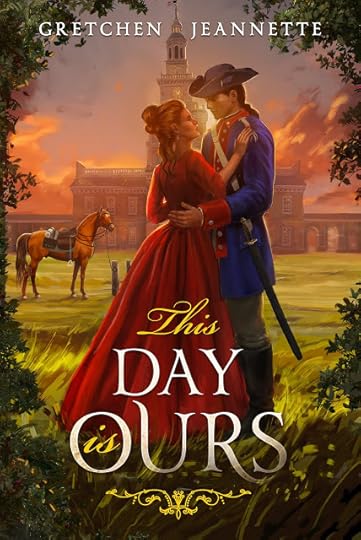
The American Colonies, 1776.As the flames of revolution spread across a divided land, a shadowy figure prowls the streets of Philadelphia. Known only as Jack Flash, rebel highwayman, he preys on wealthy aristocrats loyal to the British Crown. The unpredictable outlaw always manages to stay one step ahead of his foes, until the night he targets a Loyalist lady whose fiery spirit could spell his doom.Alexandra Pennington has her future well planned when a chance encounter turns her world upside down. Betrothed to a dashing king's man suited to her in every way, the young widow becomes entangled with an unrefined rebel fiercely opposed to British rule. Against all reason, she finds common ground with an enemy of the Crown. The sensible course for her is clear, but her bond with the notorious rogue will test her loyalty not only to her king but also to the man she vowedto marry.
Excerpt
Alexandra’s gaze flickered from one man to the other. For the life of her, she could not comprehend why Charles Villard went out of his way to include Lindsay in his circle of friends, most of whom seemed the intelligent sort. On the other hand, Charles’s willingness to accept this socially inept being indicated a charitable nature.
When a quartet of musicians hired for the occasion struck up a merry drinking song, Lindsay folded his hands over his breast, eyes fluttering. “Ah, ‘With Women and Wine I Defy Every Care,’” he sighed. “Listen to that sweet flute. How refreshing! Those churlish fifes and drums are all one hears anymore.” He signaled a steward for more wine. Plucking a lace-trimmed kerchief from his cuff, he blotted perspiration from his rouged face. “So tell me, Charlie, is North Wind ready for the race?”
“He’s not only ready; he’s unbeatable. So says my jockey, Sammy, and he knows him better than anyone.”
“Excellent! If Jameson had any backers, I would stake a frightful sum on your horse.”
“By any chance, have you seen Mr. Jameson’s stallion?” Alexandra wanted to know.
“No, I haven’t.”
“Then perhaps you shouldn’t be counting your chickens.” She could not say what inspired her next words, other than an intense dislike of Lindsay, but the challenge came forth unbidden. “I’ll be happy to accept your wager.”
Lindsay sputtered his surprise. “Oh my.”
“One hundred pounds?” she asked sweetly. “Is that frightful enough for your fancy?”
Lindsay turned his rheumy gaze on Villard, who shrugged and kept quiet, his face impassive. Lindsay looked back at Alexandra. “How can I resist such reckless derring-do? Very well, then. One hundred pounds it is.” He paused, suddenly distracted. “Charlie,” he murmured, looking toward the line of carriages parked in the drive, “the bumpkin hath arrived. Alexandra, isn’t that your coachman speaking with him?”
Turning, Alexandra saw Christopher Clue conversing with Dalton Jameson. From their animated gestures and easy smiles, she supposed this wasn’t the first time they had met. “So it is.”
“Perhaps we should leave him be,” Lindsay suggested with an attitude of distaste. “He’s clearly more at home with the help.”
Villard shot him a glance. “Mr. Jameson is my guest. I’ll thank you to remember that.”
“Never fear; I shall bravely endure his want of distinction and breeding. It’s sad to say, but I imagine his horse outranks him on both counts.”
Alexandra handed Villard her wineglass. “I’ll go and greet him.”
“But—”
“I want to give him some advice about the course. You don’t mind, do you? After all, I have a tidy sum riding on him.” She left without waiting for his reply. Gazing around at the polished crowd, she knew they would frown on her rubbing shoulders with the lower sort. Her eyes danced as qualms about impropriety gave way to an impish urge to set them all on their ears, especially Charles for subjecting her to that annoying fop.Approaching Dalton Jameson, she noticed two things about him: he was wearing the same clothes as when she first saw him, and they were not as clean as before. Preoccupied with untacking his stallion, Mercury, he glanced around on hearing her footsteps on the gravel drive.
She smiled a welcome. “Good afternoon, Mr. Jameson.”
“Good afternoon, ma’am. I’m glad to see you again.”
“And I, you.” Now she was near enough to detect something else about him: he smelled of lye soap, but this did not mask the odor that came from working with livestock. She turned her attention to Mercury, noting his alert eye, his ears pricked forward in interest. “He knows something is afoot.”
“That he does,” Jameson agreed, “but he ain’t worked up, just curious.”
Mercury did indeed seem relaxed, which Alexandra attributed not only to his natural disposition but also to Jameson’s handling of him over the past three weeks. She asked her coachman, “Christopher, have you ever seen a more superb specimen of a horse?”
“Never, ma’am. I was just telling Dalton, he has all the earmarks of a champion.”
“Would you mind looking after him for a while? Mr. Jameson and I need to discuss the fine points of the race course.”
Clue’s quick, cheerful face lit up. “Mrs. Pennington,” he ventured in a sly voice, “did you bet on this rascal?”
“Why, yes,” she said, “because he’s going to win.” She met Jameson’s look of surprise. “Isn’t that so?”
“Count on it. I’ve never lost a horse race.”
Hearing this, Alexandra amended an impression she had formed during their first meeting. He wasn’t boastful, she decided, just that sure of himself. She asked him, “Will you walk with me in the garden?”
The casual invitation seemed to tongue-tie him for a moment. Then he smiled in that free and easygoing way she remembered. “I’d be honored, Mrs. Pennington.” He handed Clue the stallion’s lead rope. “If you wouldn’t mind, give him a little water and rub him down, then walk him under the trees. Just don’t let him graze.” Satisfied that his horse was in skilled hands, Jameson gave himself over to Alexandra.
They entered a terraced garden flourishing with hardy autumn blooms. After plucking a flower head of pink phlox, she twirled the stem between her fingers, acutely aware of the tall, earthy man walking beside her. Like his stallion, he seemed at ease yet watchful, patiently awaiting her lead. Enveloped in his musky scent, she began, “I hope you won’t think me impertinent, as I’m sure you know racing much better than me, but I observed some things about the course that might prove useful to you.”
“I’m all ears, ma’am.”
“To begin with, the ground past the stable is spongy from yesterday’s rain. You should keep to the outside, as near to the posts as possible. The footing there is much firmer.”
He nodded, thoughtful as he gazed straight ahead. “What else?”
“Just past the second turn, on the right is a small pond where some geese landed this morning. I believe they’re still about. I don’t know how Mercury responds to noises, but those birds began to trumpet when I rode past.”
Another nod accompanied by a lingering glance at her. “I’ll keep that in mind.”
She had worried that he might not take her seriously, but he seemed absorbed in weighing her advice. “Oh, and one other thing,” she said. “The wooded stretch of the course is tight. Be mindful of that once you come off the third turn, as the way narrows quickly.”
“You really know your stuff.”
She blushed with pride. When she looked him full in the face, the glare of sunshine revealed a quality of his aspect she couldn’t help noticing: the stronger the light, the better he stood it. “I’ve ridden a time or two.”
“And you know a prime bit of blood when you see one. I, myself, never laid eyes on Mercury’s equal. He’s a rare gem for sure, light in hand, willing to work, and good around people to boot. That reminds me, I noticed him catching your scent earlier. He seems to like the smell of your perfume. Being this close, I have to agree with him. You’re wearing rosewater,” he inhaled deeply, “with a bit of vanilla, am I right?”
She might have been put off by his boldness were his manner not so ingenuous. “Exactly right,” she said, amazed at how seamlessly he had turned the conversation from the safe ground of horse racing to the very personal matter of her fragrance.
His tone changed too, quieter and earnest when he asked, “Did you really bet on me?”
The wonder in his eyes made her smile. “I most certainly did.”
“Knock me down with a feather. What did your Mr. Villard have to say about that?”
“What could he say? It’s my money. More to the point, I happen to think Mercury is the better horse.”
“He is that, ma’am. He’s the fastest horse around, and no mistake. His speed plain takes my breath away.”
The thought struck her that the upcoming contest would be as much a tonic for him as a chance to line his pockets. From the buoyancy of his step to his adventurous air to the eagerness animating his countenance, he exhibited a competitive spirit. If he harbored any fear of losing, she saw no indication of it.
“I won’t repeat that to Charles,” she said. “He’s anxious enough about the match. But don’t worry”—her blue eyes sparkled with mirth—“he’s sure to be gracious in defeat.”
Pick up your copy ofThis Day is OursAmazon UK • Amazon US
The Coffee Pot Book Club★★★★★ Highly RecommendedRead the full review HERE!

Gretchen Jeannette
 Gretchen lives and works in Chester County, Pennsylvania, an area rich in Revolutionary War and Colonial American history. Her enduring interest in 18th Century America began at a young age, inspired by tales of adventure, romance, and early American lore. After working as an editor for a small publishing company, she decided to write a story of her own. So began a journey fueled by her passion for breathing life into history through believable characters, authentic historical details, and stories woven with romance, action, and adventure.
Gretchen lives and works in Chester County, Pennsylvania, an area rich in Revolutionary War and Colonial American history. Her enduring interest in 18th Century America began at a young age, inspired by tales of adventure, romance, and early American lore. After working as an editor for a small publishing company, she decided to write a story of her own. So began a journey fueled by her passion for breathing life into history through believable characters, authentic historical details, and stories woven with romance, action, and adventure.Connect with Gretchen: Website • Twitter • Goodreads.
Published on April 01, 2020 20:00
M J Porter's fabulous new book — The Last King, England: The First Viking Age is now available on #NetGalley #HistoricalFiction @coloursofunison

Have you heard…?
M J Porter’s fabulous book, The Last King England: The First Viking Age is available on NetGalley for your reading pleasure.
If you love great Historical Fiction then this is the book for you.
The Last KingEngland: The First Viking AgeBy M J Porter
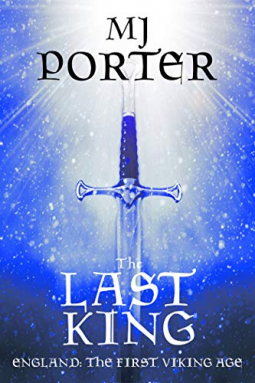
From author MJ Porter comes a thrilling new hero.They sent three hundred warriors to kill one man. It wasn’t enough.Mercia lies broken but not beaten, her alliance with Wessex in tatters.Coelwulf, a fierce and bloody warrior, hears whispers that Mercia has been betrayed from his home in the west. He fears no man, especially not the Vikings sent to hunt him down.To discover the truth of the rumours he hears, Coelwulf must travel to the heart of Mercia, and what he finds there will determine the fate of Mercia, as well as his own.
To request a copy ofThe Last KingClickHERE!
What is NetGalley?
How It Works (in their own words…)NetGalley connects publishers and authors to an enthusiastic community of early influencers who will help their book succeed: librarians and booksellers who order and recommend books to their patrons, media professionals who interview authors, reviewers and bloggers who write about books online and leave reviews on retail sites, and more. Publishers and authors list their titles on NetGalley for members to request, read, and review, and members gain free access to a vast catalog of digital review copies.
NETGALLEY FOR MEMBERS
NetGalley is a service to help readers of influence discover and recommend new books to their audiences. If you are a reviewer, blogger, librarian, bookseller, educator, journalist or other member of the media, you can use NetGalley for free to request, read, and recommend books before they are published.Your reviews and feedback are essential to publishers and other readers!
Become a NetGalley member today! NetGalley
NetGalley for Authors
Are you an author? Would you like to see your book on NetGalley. The Coffee Pot Book Club offers affordable NetGalley promotion. Click HERE to find out more.
Published on April 01, 2020 02:48
March 31, 2020
#BookReview — The Ghostly Father by Sue Barnard #HistoricalFiction #Italy @AuthorSusanB @OcelotPress

The Ghostly FatherBy Sue Barnard
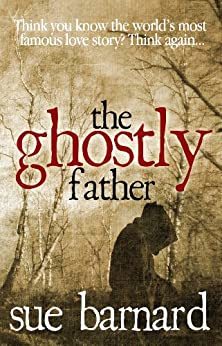
Romeo and Juliet - was this what really happened?
When Juliet Roberts is asked to make sense of an ancient Italian manuscript, she little suspects that she will find herself propelled into the midst of one of the greatest love stories of all time. But this is only the beginning. As more hidden secrets come to light, Juliet discovers that the tragic tale of her famous namesake might have had a very different outcome...
A favourite classic story with a major new twist.

"For what I have done, and for what I am about to do, may Almighty God have mercy upon me. And I have much for which I need to seek forgiveness. During my lifetime I have concealed the truth, encouraged disobedience, plotted abduction, coveted another man's wife, and helped a convicted killer to escape justice. This, for a man of God, is quite an impressive catalogue of misdemeanours."
Hidden in a drawer was a book — a very old book whose pages had yellowed with the passage of time. When Juliet carefully opened the book, she saw, to her surprise, the neat handwriting of an Italian ancestor.
Juliet's grandfather wanted only one thing for his 100th birthday. He wanted Juliet to translate the writing in the book into English so that he could understand the words and read what was written.
What Juliet discovered was a story about two Households both alike in dignity, an ancient grudge, a pair of star-crossed lovers and a Catholic friar whose secret was never meant to be told.
From an illicit love affair of the second son of a wealthy Venetian Count to the streets of fair Verona and a tragic love story that would transcend time, The Ghostly Father by Sue Barnard is the retelling of Shakespeare's Romeo and Juliet, but this time it is the Friar that is controlling the narrative.
This story is one of intense and all-consuming passion, but it is also a tale of violent hate that seemingly supersedes everything else. Blood is spilt in the streets of Verona, and a secret so terrible, so destructive that it could destroy lives as efficiently as any steel blade is about to be divulged. With a sweeping narrative that is as compelling as it was engrossing, Barnard has taken a very old story and breathed life back into it. The strong foreshadowing at the beginning of this book hints that this tale will be an inevitably tragic one. But with a novelists intuition for what is entertaining and a healthy dollop of what if? The Ghostly Father becomes a story in its own right.
The Ghostly Father is told almost exclusively from Fra' Lorenzo's point of view. In Shakespeare's play, Friar Laurence is a kindly cleric, who is desperate to restore peace upon the streets of Verona. It is his schemes and his meddling in political affairs however, that, although well intended, hurtle the young protagonists towards certain death. Barnard has taken a somewhat different approach to Fra' Lorenzo's portrayal. Barnard's Fra' Lorenzo is like still water — he runs deep. Barnard takes her readers on an intimate journey and answers some of the questions that Shakespeare's play posed, such as, how does a Catholic friar have an almost mystic knowledge of potions that will render a person seemingly dead? She also answers the question as to why he embroiled himself in Romeo's affairs in the first place. I thought Fra' Lorenzo's depiction was wonderful. He is a larger-than-life man who is dealt a rather dreadful hand in his early years, but who has the serenity to accept the things that are out of his control and be content with what he has. But this contentment is challenged when he reaches Verona, and he finds himself staring the past in the face.
Fra' Lorenzo's relationship with Prince Bartolomeo Della Scala of Verona is an interesting one — he wants to help the Prince, especially after Mercutio's death. But the Friar also has his reasons for behaving in the way he does and mostly they are to do with his past — he does not want what happened to him, to happen to Romeo. How I adored Fra' Lorenzo. He is compassionate, he is gentle, and he worries excessively about his young charges. It is impossible not to like him.
Romeo, in this book, comes across as rather juvenile, which is the way Shakespeare also portrayed him. Romeo is forever in and out of love, and even Fra' Lorenzo, who is very patient with Romeo, laments with a sign and asks "How many levels of heartache will this one bring?" Romeo is in love with the idea of love, and every time he seemingly falls in love, he is insufferable to be around. It isn't until he meets Giulietta that he realises what true love it and then a transformation occurs in his personality. He is still highly-strung and passionate in his feelings, but love tapers him somewhat to become slightly more mature in his approach to life. Barnard's portrayal of Romeo fascinated me.
There are many supporting characters in this story, and if you are a lover of all things Shakespeare and in particular Romeo and Juliet, you will recognise most of them. My favourite character in Romeo and Juliet has always been Benvolio, and I was looking forward to seeing how Barnard would approach his characterisation. I thought Benvolio's portrayal was absolutely fabulous. Like Shakespeare, she has made him a rational young man — the voice of reason when anger and hate threaten to overboil. He is genuine in his grief when Mercutio is murdered, and yet he is still thinking of others and wanting to take care of them. Barnard has also given us a young man who shoulders the responsibility of the House of Montecchi with maturity. When tragedy strikes so dreadfully, Benvolio is dependable, and yet he is also passionate, but not to the extremes as his cousin is. Benvolio's love is reserved, rational, but more importantly, reliable. Benvolio's depiction really enriched this story, and I thought his portrait was a dazzling one.
Barnard's attention to the historical detail must also be mentioned. Barnard has captured the very essence of what it must have been like to have been a friar in 14th century Verona. Barnard also writes with a great deal of authority on the subject of herbs and their uses.
If, like me, you are a lover of Shakespeare's plays, then The Ghostly Father by Sue Barnard will undoubtedly appeal. It will also interest lovers of quality Historical Fiction. In all ways, The Ghostly Father is a profoundly successful story which will stay with you long after you turn that last page.
I Highly Recommended.
Review by Mary Anne Yarde.The Coffee Pot Book Club.
Pick up your copy ofA Ghostly FatherAmazon UK • Amazon US
Sue Barnard
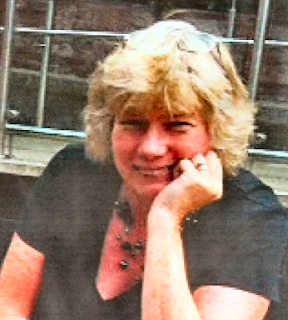 Sue Barnard is a British novelist, editor and award-winning poet whose family background is far stranger than any work of fiction. She would write a book about it if she thought anybody would believe her.Sue was born in North Wales but has spent most of her life in and around Manchester, UK. She speaks French like a Belgian, German like a schoolgirl, and Italian and Portuguese like an Englishwoman abroad.
Sue Barnard is a British novelist, editor and award-winning poet whose family background is far stranger than any work of fiction. She would write a book about it if she thought anybody would believe her.Sue was born in North Wales but has spent most of her life in and around Manchester, UK. She speaks French like a Belgian, German like a schoolgirl, and Italian and Portuguese like an Englishwoman abroad.Her mind is so warped that she has appeared on BBC TV’s Only Connect quiz show, and she has also compiled questions for BBC Radio 4’s fiendishly difficult Round Britain Quiz. This once caused one of her sons to describe her as “professionally weird.” The label has stuck.Sue lives in Cheshire with her extremely patient husband and a large collection of unfinished scribblings.
Connect with Sue: Ocelot Press • Blog • Twitter • Amazon Author Page.
Published on March 31, 2020 21:00
Perverse – a collection of short prose and verse by Tim Walker is only 0.99 on #Kindle for a Limited Time @timwalker1666

Perverse – a collection of short prose and verseBy Tim Walker

PERVERSE is an eclectic collection of short, snatched memories and random ideas that tumbled out of a monthly spoken word event called The Innerverse.‘Perversity’, is an obstinate urge or contrary behaviour; a wilful desire to not conform.That made me think - life can sometimes be perverse – full of contradictions, disappointments, grief and sheer bloody-mindedness. But despite this, our sense of what is right and our collective willingness to submit to the rule of law, provides a counter balance that somehow gets us through.I hope you enjoy this collection of verse and prose - a pastiche of my life, a nod to history and current affairs, a wistful look back, a hope for better days, and a celebration of life and all its riches.
Excerpt
SLOUGH, YEAR 100 AD
We cry and spit the bitter taste of defeatOur men slaughtered and our women weepChildren only remain to harvest the cropsAn ill wind blows along the track to our villageSwirling around the post where a dead owl wards off evil spiritsWe are the Cantuvelauni peopleFishers of the river, hunters and foragers of the great forestWhen the men from Rome first came, we ran and hidWe listened from the dark forest to the rhythmic tramp of bootsClutching our charms to protect us from evil spirits and mumbling the wordsThe jangle of metal, the cries in a foreign tongue as they approachedThrough our wooden gateway into our stockade ringed with sharpened stakesThat keep out the animals of the forest and deter other tribesBut not the men from Rome, wherever that may be - A new name for hell, perhaps.They scattered the fowl and pigs and yapping dogs soon cowered and whimperedTheir Trinovante guide tells our headman they will pave our road to make it strongWhat is a road? Our grey-haired leader asks.The narrow tracks that connect our villages have been there since the dawn of timeGiven to us by our mother, Brigantia, who whispers to us in the windBut now our conquerors will make use of them to keep us at heelThey will put flattened rocks on a stony pathway to connect their forts.They are here to stay.
Our druid tells us not to be afraidBut he runs to hide in the forest whenever they approachOur young men come to visit and stand proud and tallDressed in the Roman fashion in toga and sandals of leatherWe laugh and hug them and covet their shoesThe Romans have taught them their ways and they can read their symbols.They show the boys how to catch fish in netsTheir laughter entwines with the splash and flash of silver as they take turns to cast itSmall stones dragging it to the depths where sits Father Tamesis, waitingOur mighty river flows from before the dawn of menThat feeds and refreshes us and receives our offeringsIt never lies nor betrays, but sometimes takes one of usWe are the new slaves of Rome but one day will be freeThe rushing flow carries our hopes to the sea of lifeThey command us but they will never own our souls.
Only 0.99 on Kindle for a Limited Time.Amazon
Only 4.99 in Paperbook for a Limited Time.Amazon
Tim Walker
 Tim Walker is an independent author living near Windsor in the UK. He grew up in Liverpool where he began his working life as a trainee reporter on a local newspaper, The Woolton Mercury. A media career ensued, including a stint overseas in Zambia.His creative writing journey began in earnest in 2013, as a therapeutic activity whilst recovering from cancer treatment. He started an historical fiction series, A Light in the Dark Ages, in 2015, following a visit to the near-by site of a former Roman town. The aim of the series is to connect the end of Roman Britain to elements of the Arthurian legend, presenting an imagined history of Britain in the early Dark Ages.His latest book is Arthur, Dux Bellorum, a re-imagining of the story of King Arthur, published in March 2019. Book four in the A Light in the Dark Ages series, it won two book awards in April 2019 - One Stop Fiction Book of the Month and the Coffee Pot Book Club Book Award. The final book in the series, Arthur Rex Brittonum, is due out in June 2020.The series starts with Abandoned (second edition 2018); followed by Ambrosius: Last of the Romans (2017); and book three, Uther's Destiny (2018). Series book covers are designed by Canadian graphic artist, Cathy Walker. Tim is self-published under his brand name, timwalkerwrites.Tim has also written two books of short stories, Thames Valley Tales (2015), and Postcards from London (2017); a dystopian thriller, Devil Gate Dawn (2016); and two children's books, co-authored with his daughter, Cathy - The Adventures of Charly Holmes (2017) and Charly & The Superheroes (2018) with a third in the pipeline – Charly in Space.
Tim Walker is an independent author living near Windsor in the UK. He grew up in Liverpool where he began his working life as a trainee reporter on a local newspaper, The Woolton Mercury. A media career ensued, including a stint overseas in Zambia.His creative writing journey began in earnest in 2013, as a therapeutic activity whilst recovering from cancer treatment. He started an historical fiction series, A Light in the Dark Ages, in 2015, following a visit to the near-by site of a former Roman town. The aim of the series is to connect the end of Roman Britain to elements of the Arthurian legend, presenting an imagined history of Britain in the early Dark Ages.His latest book is Arthur, Dux Bellorum, a re-imagining of the story of King Arthur, published in March 2019. Book four in the A Light in the Dark Ages series, it won two book awards in April 2019 - One Stop Fiction Book of the Month and the Coffee Pot Book Club Book Award. The final book in the series, Arthur Rex Brittonum, is due out in June 2020.The series starts with Abandoned (second edition 2018); followed by Ambrosius: Last of the Romans (2017); and book three, Uther's Destiny (2018). Series book covers are designed by Canadian graphic artist, Cathy Walker. Tim is self-published under his brand name, timwalkerwrites.Tim has also written two books of short stories, Thames Valley Tales (2015), and Postcards from London (2017); a dystopian thriller, Devil Gate Dawn (2016); and two children's books, co-authored with his daughter, Cathy - The Adventures of Charly Holmes (2017) and Charly & The Superheroes (2018) with a third in the pipeline – Charly in Space.Connect with Tim: Website • Amazon Author Page • Facebook • Twitter.
Published on March 31, 2020 20:30
Check out Sam Thompson's fabulous book — A Walk to Revenge #Crime #Thriller #MustRead @manny745

A Walk to RevengeBy Sam Thompson

An explosive story of murder, corruption and manipulation.A drizzly Manchester night, a hit and run and a chance meeting decades later lead ultimately to the exposure of a transatlantic crime family. Their story begins during the twenties New York prohibition era and follows its evolution into a modern-day underworld business. Jake Hughes and DI Jonty Ball threaten the empire and as a web of murder and deceit is exposed, the crime family bares its’ teeth, leading to an explosive finale where the winner takes all! Or do they?
Excerpt
The first hour of the flight passed quickly. Ray began to flick through the inflight magazine, obviously geared up for holidaymakers and flights to the various countries that the airline serviced. He read with interest the places in the South of France, an area that he and Francesca had discussed and planned to visit soon. I must make that happen for us, he thought.
Just then, he heard a deafening crash he instinctively looked out of the window. As if in slow motion, he watched as the wing fell away from the main body of the plane. At the same time, the plane began to roll on its side. The passengers in the cabin began screaming and panicking. The cabin staff were unable to move down the aisle as the plane had tilted on to its side. It was free falling and spinning in the air, like a coin spinning on its side on a smooth table top.
Then there was a second explosion as the second wing fell away, followed by a split-second respite as the drag of the wing caused the plane to spiral, and the spinning stopped. The plane fell, like a dart in the air – vertically! The gravitational force pushed Ray’s skin tight against his bones. It felt as though the bone and skin had melded and was turning inside out, his teeth clamping in his mouth so tight that he could feel his jaw beginning to crack. His eyes were popping out of their sockets.
Passengers, as well as cabin crew, were flying into him and over his head, the screaming dying down as people could no longer vocalise through their mouths as the gravity tugged at them. All went quiet. Ray could only discern the noise of the wind; he visualised tumbleweed rolling down a Western street, like a movie. He had only seconds left before he passed out.
Roberto’s phone rang. He picked it up. Giovanni’s voice was on the other end.
“It’s done!” The phone went dead.
Pick up your copy ofA Walk to RevengeAmazon UK • Amazon USRead for FREE with

Sam Thompson
 I made the decision to retire in 2015 following a career in banking.After living my life in the Greater Manchester area, I moved to South Cumbria in 2011 due to a position in my employment.On retirement, I made the decision to stay in the Lake District area.An ambition was always to write a novel, I finally found that retirement allowed me the time to do this.My first novel, A Walk to Revenge is a crime story based around a crime family that evolves from America’s twenties prohibition era, to modern day UK.I am writing a sequel which is nearing the end. Ihave titled the book Sartori. In addition I enjoy poetry and have written a book of poems.I enjoy playing golf, and I follow football, I played when I was younger. I have taken up walking football twice a week, although that is on hold in the current environment.
I made the decision to retire in 2015 following a career in banking.After living my life in the Greater Manchester area, I moved to South Cumbria in 2011 due to a position in my employment.On retirement, I made the decision to stay in the Lake District area.An ambition was always to write a novel, I finally found that retirement allowed me the time to do this.My first novel, A Walk to Revenge is a crime story based around a crime family that evolves from America’s twenties prohibition era, to modern day UK.I am writing a sequel which is nearing the end. Ihave titled the book Sartori. In addition I enjoy poetry and have written a book of poems.I enjoy playing golf, and I follow football, I played when I was younger. I have taken up walking football twice a week, although that is on hold in the current environment.Connect with Sam: Twitter.
Published on March 31, 2020 20:00
March 26, 2020
#BookReview — Across the Great Divide: Book 1 The Clouds of War by Michael L. Ross #HistoricalFiction # AmericanCivilWar @MichaelLRoss7

Across the Great Divide:Book 1 The Clouds of WarBy Michael L. Ross
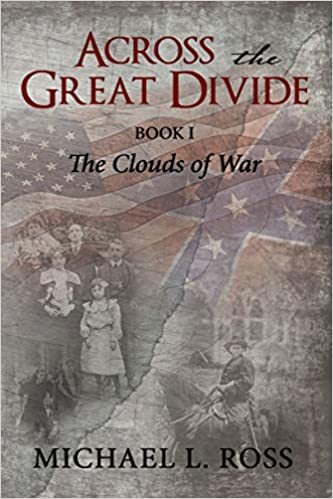
Lexington, Kentucky, 1859. After saving John Hunt Morgan from a puma attack, fifteen-year-old farm boy Will Crump joins Hunt’s militia, the Lexington Rifles. Morgan mentors Will and enrolls him in the local university, where he hopes to study law. As tensions rise between the North and South, Will is torn between his loyalty to Morgan and his love for his family. Will’s father, sisters, and sweetheart follow the Union, while Morgan and Will commit to the South. As part of Morgan’s band, Will participates in ambushes and unconventional warfare until his first real battle at Shiloh. He fights bravely, but increasingly questions what the war is accomplishing, and whether his devotion to honor has led him astray. And where is God in all this killing?
Will’s sister Albinia, friend of the Clay family, becomes increasingly aware of the plight of the slaves. When she finds Luther, a slave she knows, trying to escape, she must decide between her conscience, and her friends. She becomes involved in the Underground Railroad, helping slaves to freedom – but will it cost her love and her freedom?
Will’s other sister, Julia, is approaching spinster status and despairs of ever meeting a man who can give her more than life on a farm until she meets Hiram Johannsen, a son of immigrants who owns a steamship company. They marry and she makes a new life in the North. When Hiram answers the call to fight for the North, Julia runs the steamboat company in her husband’s absence and uses her boats to help Albinia ferry escaped slaves to freedom. Her business relations put her in the perfect position to spy for the North. When the Confederates capture her, will she survive?
Luther is one of the first slaves Albinia helps flee the South after his master cruelly abuses his mother and sister. He escapes with his family, and when war breaks out, he fights for the North as an auxiliary of the Third Ohio Cavalry, alongside Julia’s husband, Hiram, and against Morgan and Will. Luther has to confront the demons of his past, an abusive master, and a slave catcher that kills his little sister. Will the desire for revenge destroy him?
Throughout the war, Will is forced to examine and question everything he believes in—his faith in God, his love for his family, his loyalty to Morgan, and his worth as a human being.
Will and his family must somehow mend the torn fabric of relationships to find peace, and reach Across the Great Divide.

"Perhaps, one day, the color of a man's skin and the money in his pocket will not matter so much as the character in his heart. I pray that day comes quickly. In the meantime, sir, I have met many former slaves with better manners than yourself. Perhaps you could learn from them!"
Fifteen-year-old Will Crump had no idea of what the future would entail for him. After saving John Hunt Morgan from a puma attack, Will is given a chance to fulfil his dreams and become an educated man. There is one catch. If he accepts Morgan's proposition, he has to join the Lexington Rifles.
It is hard to close your eyes once they have been opened. Albinia Crump can no longer remain silent. Her views may be in the minority, but that did not mean that they were wrong, and she would not stand by and allow Luther to be tortured and executed because he dared to try and rescue his family from the brutalisation of their plantation owners. However, this is not something Albinia can fight alone. She needs help, and she needs it now.
Julia Crump is fast approaching spinsterhood, and it is time she settled down and found a husband. However, Julia wants more from life than that of a farmer's wife. Perhaps the handsome Hiram Johannsen will make all of her dreams come true?
From a young man's dream of a golden future to the horrors of Camp Douglas in Chicago, Across the Great Divide: Book 1 The Clouds of War by Michael L. Ross is the story of one family that is torn apart by war, pride, beliefs, and ambition.
Ross has composed a book that is astoundingly ambitious but, in all ways, absolutely triumphant. This story begins at the first muttering of unrest in a country that was not only politically divided but morally divided as well, and it ends with the Confederate surrender in 1865 and the subsequent release of the prisoners of war. In between the pages of this remarkable book is a story of one family who finds themselves on opposite sides during the war between the North and the South of America. It is a tear-jerking story of heroism and tragedy. It is a tale of survival, of fear, hate, and the insufferable torment of the soul that comes from opening fire on your fellow countryman. But this is also a book about forgiveness, mercy, and above everything else, love. Ross has penned an extraordinarily compelling and unforgettable account of one family as they navigated the American Civil War (1861 – 1865).
With astonishing attention to the historical detail, Ross, it seems, has a visceral understanding of the era this book is set in. He also has a novelist's skill to breathe life into people who have long since died. The hours of research that has gone into this book is self-evident — no one can write such crystalline prose without such dedicated devotion to the period. The battle scenes in this book are exceptionally well drawn and were brought vividly back to life — I could smell the blood, and feel the abject terror of the soldiers. I also must mention the depiction of Camp Douglas. — the horrors and the poverty the prisoners of war endured was portrayed with a great deal of skill and diligence to the historical facts. This book is, without a shadow of a doubt, a monumental work of scholarship. It is utterly splendid and a reward for any fan of quality Historical Fiction.
With an almost tangible realism, Ross has given us a protagonist that feels deeply, who is torn by his sense of honour, and who suffers terribly because of his choices. Ross introduces us to a young and to an extent idealistic William Dorsey Crump (1844–1940). Ross has stayed as close to the document history of Crump as he can, but he has also used a little creative licence to resurrect this fascinating character who served under Confederate General John H. Morgan (1825 – 1864). Will is immensely likeable, and like many soldiers on both sides, he doesn't really have much of an opinion on emancipation. He believes he is fighting for his home, and for Morgan. He follows Morgan into Hell on more than one occasion and continues to do so throughout the length of this novel. Will suffers greatly in this book, and he witnesses things, and he does things that haunt his days and torture his nights. Ross has not glossed over the horrors of war, for we see them through Will's eyes, and nor has he neglected the mental toll that such terrible circumstances can have on a person. I was fascinated by Will's journey. It is one of youthful enthusiasm which slowly becomes disenchantment when he loses friends to a brutal and seemingly pointless conflict. Ross has captured the very essence of what life must have been like for a Confederate soldier during this time. Kudos, Mr Ross. Kudos, indeed.
Albinia Crump is a reckless, rash young woman who cannot abide to witness the wickedness of slavery. Many may well justify their rights to own slaves with passages from the Bible, but Albinia knows in her heart that it is wrong and so she must risk everything and she must be prepared to lose everything if she is to stay true to herself. Ross' depiction of Albinia is utterly sublime. Not only has he given his readers a morally good character, but also one that is willing to make many sacrifices because she knows that what she sees is wrong and she cannot stand by and do nothing. Albinia faces many challenges and terrible hardships in this novel, and it would have been very easy for her to retreat into herself and give-up, but her tenacious determination to see this through to the end made her story not only compelling but utterly irresistible.
Julia Crump's story is one that is almost eclipsed by her brother's war and her sister's work with The Underground Railroad, but it still emphasised the lack of empathy that people felt towards slaves and those who had escaped bondage when it came down to economics. There is a genuinely heartbreaking scene in this book where a slave is being beaten very cruelly, but everyone ignores her plight. When Julia questions her mother-in-law why someone is not stopping it, her mother-in-law simply answers that it is "…not our business." Julia may not be as skilled as her sister, but she does try to do her part in undermining the South — although with no formal training as a spy, Julia is a walking disaster, but again this strong sense of doing the right thing makes her a protagonist that a reader can really get behind.
I have to also quickly mention the portrayals of General John H. Morgan and General Basil W. Duke. I thought the depiction of both of these men was marvellous, and once again it showed how much research has gone into writing this book. One more character that deserves recognition as well is Luther. Luther is an escaped slave, and oh my goodness what a terrible journey he finds himself on. Luther's story is utterly heart-rendering, but it also demonstrates the difference one person can make. I thought Luther's depiction was majestic and very real in the telling.
I cannot praise this book enough. Across the Great Divide: Book 1 The Clouds of War by Michael L. Ross is fabulous from start to finish, and I cannot wait to get my hands on Book 2 of what promises to be an unforgettable series.
Fans of John Jakes', North and South trilogy, will find something endlessly fascinating about this novel.
I Highly Recommend.
Review by Mary Anne Yarde.The Coffee Pot Book Club.
Pick up your copy ofAcross the Great DivideAmazon UK • Amazon US
Michael L. Ross
 Amazon bestseller Michael Ross is a lover of history and great stories. He’s a retired software engineer turned author, with three children, and five grandchildren, living in Newton, Kansas with his wife of 39 years. Michael graduated from Rice University and Portland State University. He was born in Lubbock, Texas, and still loves Texas. He’s written short stories and technical articles in the past. “Across the Great Divide: Book 1 The Clouds of War” is his first novel
Amazon bestseller Michael Ross is a lover of history and great stories. He’s a retired software engineer turned author, with three children, and five grandchildren, living in Newton, Kansas with his wife of 39 years. Michael graduated from Rice University and Portland State University. He was born in Lubbock, Texas, and still loves Texas. He’s written short stories and technical articles in the past. “Across the Great Divide: Book 1 The Clouds of War” is his first novelConnect with Michael: Website • Twitter • Goodreads.
Published on March 26, 2020 21:00
March 24, 2020
Check out Catherine Kullmann's fabulous #NewRelease — The Potential for Love #RegencyRomance @CKullmannAuthor
Published on March 24, 2020 22:00
The Coffee Pot Book Club
The Coffee Pot Book Club (formally Myths, Legends, Books, and Coffee Pots) was founded in 2015. Our goal was to create a platform that would help Historical Fiction, Historical Romance and Historical
The Coffee Pot Book Club (formally Myths, Legends, Books, and Coffee Pots) was founded in 2015. Our goal was to create a platform that would help Historical Fiction, Historical Romance and Historical Fantasy authors promote their books and find that sometimes elusive audience. The Coffee Pot Book Club soon became the place for readers to meet new authors (both traditionally published and independently) and discover their fabulous books.
...more
...more
- Mary Anne Yarde's profile
- 159 followers



